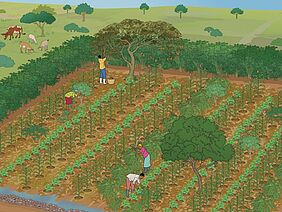Agroforestry can offer multiple benefits to farmers in the Sahelian region, notably by improving soil quality and increasing agricultural productivity. Furthermore, trees in agricultural systems can provide fodder and mulch in dry seasons, protect soil from erosion, provide shade for animals and people and increase moisture. Trees and shrubs can increase crop yields by 100–800 percent in arid regions like the Sahel.
New concise publications
SustainSahel has compiled the advantages as well as the application of agroforestry in their new publications (see links below). They aim to guide and inspire farmers and agricultural extensionists to start, further develop or improve agroforestry systems. The video "Advantages of agroforestry in the Sahel" highlights the benefits of agroforestry. Furthermore, it explains a variety of suitable tree and shrub species and their growing. The second video presents "An example of an agroforestry farm in the Sahel".
The flyer also points out the advantages of agroforestry. It continues to demonstrate some of the most beneficial species to incorporate into agroforestry systems individually. Then, it shows them incorporated into an example agroforestry system as a large poster.
The fold-out flyer is available in French and the videos have been made available in French, as well as the main languages spoken in SustainSahel's intervention zones: Bambara, Mooré, Serere, Pulaar and Wolof. The videos were shared with farmers involved in the project using mini SD-cards.
Further information
Contact
Publications
- youtube.com: Video "Advantages of agroforestry in the Sahel"
- youtube.com: Video "An example of an agroforestry farm in the Sahel"
- zenodo.org: Flyer "Benefits of trees and shrubs in the field"
Links
- sustainsahel.net: Publications on SustainSahel website
- youtube.com: SustainSahel YouTube channel




